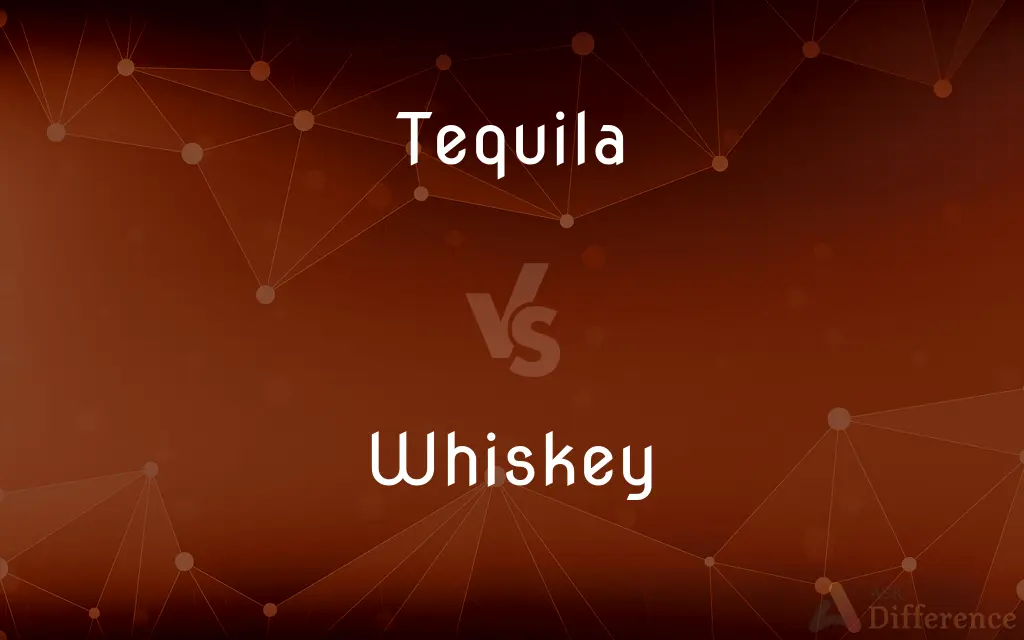Tequila vs. Whiskey — What's the Difference?
Edited by Tayyaba Rehman — By Urooj Arif — Updated on April 15, 2024
Tequila is distilled from the blue agave plant and primarily produced in Mexico, while whiskey is made from various grains and distilled worldwide.

Difference Between Tequila and Whiskey
Table of Contents
ADVERTISEMENT
Key Differences
Tequila is made exclusively from the blue agave plant, particularly in regions around Jalisco, Mexico, which is the spirit's geographical indication. Whiskey, on the other hand, is made from fermented grain mash, including barley, corn, rye, and wheat, and is produced in many countries, each with its own distinct style.
The production process of tequila involves harvesting the agave, cooking the core to extract sugars, and then fermenting and distilling the juice. Whiskey's process includes mashing the grains, fermenting the mash, and then distilling the liquid before aging it in wooden barrels, which significantly influences its flavor.
Tequila is typically aged in oak barrels for less time compared to whiskey. Some tequilas are not aged at all (blanco), while others may be aged for several years (añejo). Whiskey, however, is often aged for many years, with the aging process being crucial for developing its depth and complexity of flavors.
In terms of consumption, tequila is famously consumed as shots with salt and lime, and is popular in cocktails like the Margarita. Whiskey is frequently enjoyed neat or on the rocks and is a staple in classic cocktails such as the Old Fashioned and the Manhattan.
Tequila's flavor is characterized by its crisp, sweet, and sometimes earthy notes derived from agave, while whiskey's flavor profile is broad, ranging from smooth and sweet to smoky and peaty, influenced by its ingredients and aging process.
ADVERTISEMENT
Comparison Chart
Base Ingredient
Blue agave
Various grains (barley, corn, rye, wheat)
Geographic Origin
Mainly Mexico
Worldwide (Scotland, USA, Ireland, etc.)
Production Process
Harvest agave, cook, ferment, distill
Mash grains, ferment, distill, age
Aging
Blanco to añejo (0-3+ years)
Typically several years
Common Consumption
Shots, cocktails (Margarita)
Neat, on the rocks, cocktails (Old Fashioned)
Compare with Definitions
Tequila
A distilled spirit made from the blue agave plant, primarily in Mexico.
The clarity and crispness of blanco tequila make it popular in cocktails.
Whiskey
Flavor profiles range from sweet and smooth to smoky and peaty, depending on the type and aging process.
Islay Scotch whisky is noted for its strong peaty flavor.
Tequila
Integral to many popular cocktails like the Tequila Sunrise and Margarita.
A Margarita combines tequila with lime juice and orange liqueur.
Whiskey
Varieties include Scotch, bourbon, and rye, each with distinct characteristics.
Bourbon, an American whiskey, is rich in corn, giving it a sweeter flavor.
Tequila
Comes in several varieties based on aging: blanco, reposado, and añejo.
Reposado tequila is aged in oak barrels for between two months and one year.
Whiskey
A distilled alcoholic beverage made from fermented grain mash.
Scotch whisky is made primarily from malted barley.
Tequila
Often consumed with salt and lime to enhance its earthy flavors.
Tequila shots at a party are usually accompanied by lime wedges and salt.
Whiskey
Aged in wooden casks, often old sherry, bourbon, or new oak barrels.
The aging process in charred oak barrels is essential for developing whiskey’s complex flavors.
Tequila
Protected by a denomination of origin, meaning it must be produced in specified Mexican states.
Most premium tequilas come from Jalisco, known for its ideal agave-growing conditions.
Whiskey
Commonly served neat, or in classic cocktails.
Whiskey sours and Manhattans showcase whiskey's versatility in cocktails.
Tequila
Tequila (; Spanish: [teˈkila] (listen)) is a distilled beverage made from the blue agave plant, primarily in the area surrounding the city of Tequila 65 km (40 mi) northwest of Guadalajara, and in the Jaliscan Highlands (Los Altos de Jalisco) of the central western Mexican state of Jalisco. The red volcanic soils in the region of Tequila are well suited for growing the blue agave, and more than 300 million of the plants are harvested there each year.
Whiskey
An alcoholic liquor distilled from grain, such as corn, rye, or barley, and containing approximately 40 to 50 percent ethyl alcohol by volume.
Tequila
A Mexican alcoholic spirit made from an agave.
Whiskey
A drink of such liquor.
Tequila
An alcoholic liquor distilled from the fermented sap of the blue agave.
Whiskey
A liquor distilled from the fermented mash of grain (as rye, corn, or barley).
Tequila
An alcoholic liquor distilled from the fermented juice of the Central American century plant Agave tequilana.
Whiskey
A drink of whiskey.
Tequila
An intoxicating liquor made from the maguey in the district of Tequila, Mexico.
Whiskey
(historical) A light gig or carriage; a tim-whiskey.
Tequila
Mexican liquor made from fermented juices of an Agave plant
Whiskey
(international standards) nodot=1 NATO/ICAO Phonetic Alphabet.}}
Whiskey
Same as Whisky, a liquor.
Whiskey
A light carriage built for rapid motion; - called also tim-whiskey.
Whiskey
A liquor made from fermented mash of grain
Common Curiosities
What is the main difference in base ingredients between tequila and whiskey?
Tequila is made from the blue agave plant, while whiskey is made from various grains.
How does the aging process differ between tequila and whiskey?
Tequila may be aged briefly or not at all, whereas whiskey is typically aged for several years to develop its flavor.
Can tequila be produced outside of Mexico?
Legally, tequila must be produced in specific regions of Mexico to be labeled as such.
What distinguishes Scotch from other types of whiskey?
Scotch is whiskey made in Scotland, typically from malted barley, and known for its earthy and sometimes peaty flavor.
Is bourbon considered a type of whiskey?
Yes, bourbon is a type of American whiskey made primarily from corn.
How do the production methods of tequila and whiskey affect their tastes?
Tequila's taste is heavily influenced by the earthy flavors of agave, while whiskey's flavor complexity is shaped by the type of grains used and the aging process.
What are the typical flavors associated with whiskey?
Whiskey flavors can range from sweet and fruity to smoky and peaty, depending on the type and barrel aging.
How important is the region in the production of tequila and whiskey?
The region is crucial, as it influences the characteristics of the base ingredients and the authenticity (like tequila's denomination of origin).
Why do some people drink tequila with salt and lime?
Salt and lime can enhance the flavor of tequila and offset its potent kick.
What is the best way to enjoy whiskey to appreciate its full flavor?
Drinking whiskey neat or with a small amount of water can help to fully appreciate its flavors and aromatic complexity.
What are some popular whiskey-based cocktails?
Popular whiskey cocktails include the Old Fashioned, Manhattan, and Whiskey Sour.
Why does tequila have different categories?
Tequila categories (blanco, reposado, añejo) reflect different aging periods, which significantly affect the flavor and smoothness.
What is reposado tequila?
Reposado tequila is aged in oak barrels for two months to a year, offering a balance between the pure flavors of the agave and the complexity introduced by aging.
What role does wood play in whiskey aging?
Wood casks contribute to flavor, color, and texture, adding elements such as vanilla, caramel, and spice to the whiskey.
Can whiskey be made from any grain?
Yes, whiskey can be made from any grain, including barley, corn, rye, and wheat, each contributing distinct flavors and qualities to the final product.
Share Your Discovery

Previous Comparison
Explain vs. Describe
Next Comparison
Romans vs. GreeksAuthor Spotlight
Written by
Urooj ArifUrooj is a skilled content writer at Ask Difference, known for her exceptional ability to simplify complex topics into engaging and informative content. With a passion for research and a flair for clear, concise writing, she consistently delivers articles that resonate with our diverse audience.
Edited by
Tayyaba RehmanTayyaba Rehman is a distinguished writer, currently serving as a primary contributor to askdifference.com. As a researcher in semantics and etymology, Tayyaba's passion for the complexity of languages and their distinctions has found a perfect home on the platform. Tayyaba delves into the intricacies of language, distinguishing between commonly confused words and phrases, thereby providing clarity for readers worldwide.














































